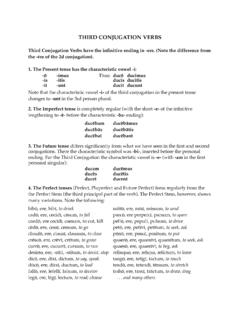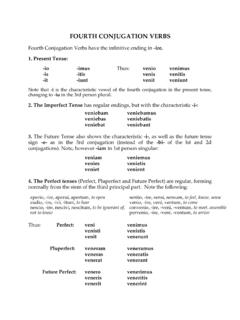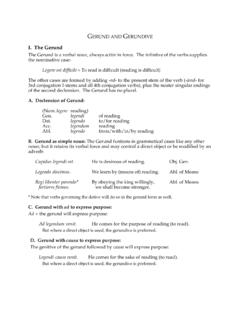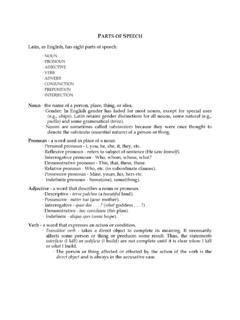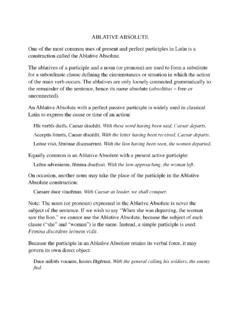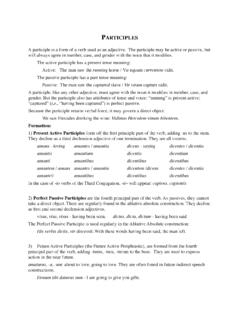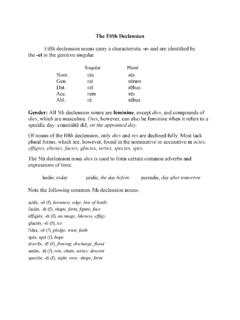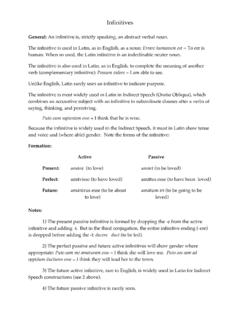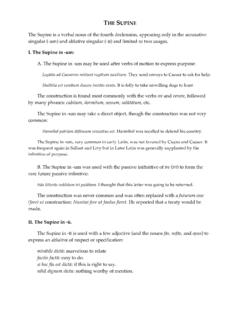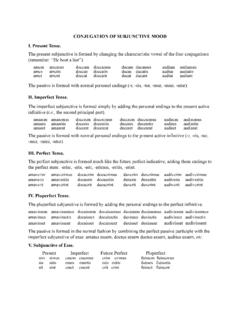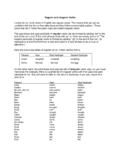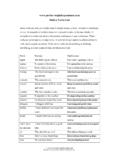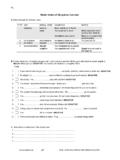Transcription of DEPONENT VERBS - The Latin Library
1 DEPONENT VERBS There is a group of VERBS in Latin which have passive forms but active meanings. They are called DEPONENT VERBS because they have laid aside (d p n , -ere) their passive meanings but have retained their passive forms. They are translated only in the active voice. Thus: loquor, loqui, locutus sum, to speak, talk loquor = I speak loquitur = he, she, it speaks etc. The conjugation of DEPONENT VERBS is completely regular: First conjugation: c nor, - r , - tus sum, to try, attempt Second conjugation: polliceor, - r , pollicitus sum, to promise Third conjugation: loquor, loqu , locutus sum, to speak, talk Fourth conjugation: orior, or r , ortus sum, to rise, arise Note 1: DEPONENT VERBS , however, have retained a few regular active forms: a.
2 The present active participle: loqu ns, -entis = speaking b. The future active participle: locut rus, -a, -um = about to speak c. The future active infinitive: locut rus esse = to be about to speak Note 2: Because DEPONENT forms are translated actively, they can have no 4th principal part ( , they have no perfect passive participle). Instead, the participle form contained in the 3rd principal part (conatus, pollicitus, locutus, ortus, etc.) is a perfect active particple. This participle fills a much needed gap in the language and accordingly is frequently used. Thus: conatus = having tried pollicitus = having promised locutus = having spoken ortus = having arisen SEMI- DEPONENT VERBS : Four VERBS in Latin have active forms in the first two principal parts, but DEPONENT forms in the third principal part ( , the perfect tense).
3 They also are translated only in the active voice. These VERBS are: aude , - re, ausus sum, to dare gaude , - re, g v sus sum, to rejoice f d , -ere, f sus sum, to trust sole , - re, solitus sum, to be accustomed to COMMON DEPONENT VERBS : lst Conjugation: arbitror, - r , - tus sum, to think c nor, - r , - tus sum, to try, attempt hortor, - r , - tus sum, to encourage, urge moror, - r , - tus sum, to delay m ror, - r , - tus sum, to wonder at, be surprised 2nd Conjugation: polliceor, - r , pollicitus sum, to promise videor, - r , v sus sum, to seem vereor, - r , veritus sum, to fear mereor, - r , meritus sum, to deserve, earn 3rd Conjugation: loquor, loqu , loc tus sum, to speak, talk patior, pat , passus sum, to suffer.
4 Permit, allow profic scor, profic sc , profectus sum, to set out, depart aggredior, - , aggressus sum, to approach, attack congredior, - , congressus sum, to meet, come together gredior, - , gressus sum, to go out, disembark pr gredior, - , pr gressus sum, to advance, go forward sequor, sequ , sec tus sum, to follow tor, - , usus sum, to use, make use of (+ abl.) morior, - , mortuus sum, to die (fut. act. part. = morit rus) n scor, - , natus sum, to be born; be found revertor, - , reversus sum, to go back, return 4th Conjugation: orior, - r , ortus sum, to rise, arise potior, - r , pot tus sum, to get possession of (+ abl.)
5 Opperior, - r , oppertus sum, to await, wait for
